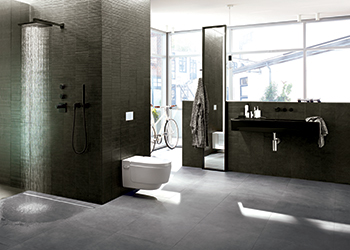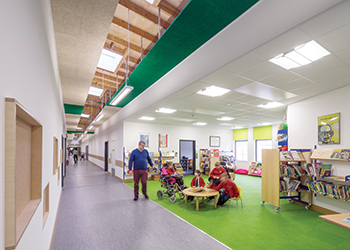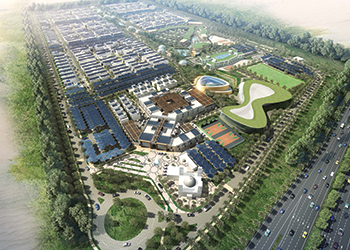
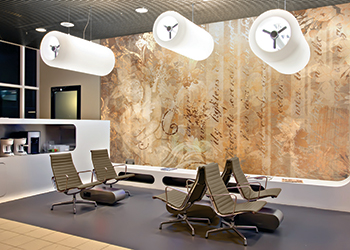 Maximus Mega Slab ... available in 1.35 by 3 m size.
Maximus Mega Slab ... available in 1.35 by 3 m size.
Buildings need to satisfy a number of criteria to attain green credentials, including water conservation and the use of sustainable materials. The UAE-based ceramic and sanitary ware manufacturer RAK Ceramics offers a diverse range of products designed to help with this, including low flush water closets and the completely waterless urinal system.
All water closets in the sanitary ware line use water-saving flush technology with a six-litre full flush and three-litre half flush as opposed to the old style nine-litre flush system – offering a 33 per cent saving compared with a traditional system.
The company has also launched the Eco-Fresh-Waterless Urinal Sanitation System, an advanced urinal sanitation system which requires absolutely no water to flush. Through a joint venture, it also manufactures eco-friendly faucets and bathroom fittings with water-saving features offering up to 60 per cent saving on water consumption.
In its tiling ranges, RAK Ceramics also produces environment-friendly products such as the Wood Art Collection, which provides the look and feel of real wood but without having to fell trees. Similarly, the Stone Art Tiles Collection offers digitally enhanced tiles which act as a replacement for natural stone.
Environment-friendly tiles, such as RAK Slim, reduce the use of natural resources and streamline the manufacturing process to reduce energy costs. Their durability provides longevity and means that they will not need to be replaced as often as other tiles.
RAK Slim is described as a unique ‘green building’ product which has tremendous energy-saving features, coupled with a more environment-friendly manufacturing process.
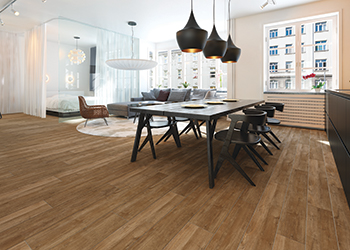 |
|
Wood Art Collection ... look and feel of real wood. |
Commenting on some of the company’s latest green products, Abdallah Massad, CEO of RAK Ceramics, says: “There is a trend at the moment for larger tiles, as people desire a more streamlined look. RAK Ceramics, therefore, launched the Maximus Mega Slab which is available in a gigantic size of 1.35 by 3 m, allowing customers to create visually stunning floors and walls. It is the first company in the region to produce such a large format. The entire collection is completely eco-friendly and is a superior alternative to natural marble, wood and metal, as it conserves natural resources.”
Promoting and supporting sustainable building is extremely important to RAK Ceramics, which is an active member of a number of a number of organisations, such as the World Ceramic Tiles Forum which ensures that the global ceramic industry thrives in a sustainable manner, says Massad. “From packaging to transportation, everything RAK Ceramics does has sustainability at the fore. It is leading the way in driving this forward, and is committed to using local suppliers and distributors in order to support the community. All of its suppliers must provide a declaration of ethical conduct of goods and services, and they must also satisfy certain criteria including environment and health and safety,” he says.
“RAK Ceramics also works closely with the Environment Protection and Development Authority of Ras Al Khaimah (EPDA-RAK) in protecting and preserving the environment, and is involved in joint training programmes on environmental and health and safety issues. In addition, the company is associated with Emirates Environmental Group (EEG), which is devoted to protecting the environment through education, action programmes and community involvement,” he adds.
The company’s products have contributed to the success of a number of projects both in the Middle East and abroad.
In Saudi Arabia, RAK Ceramics has provided products for Najran University, as the architects found the Stone Art Collection best suited for exterior wall applications, according to Massad.
In addition, Riviera floor porcelain tiles were used because of their high strength and ability to resist stains, chemicals and deep abrasion, he adds.
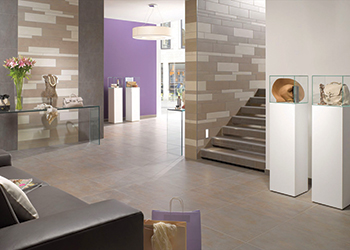 |
|
Stone Art ... high strength and resistance to scratches and stains. |
Meanwhile, the Stone Art series was chosen by the contractor for RAK Hospital because of its durable nature, especially in high footfall areas. These products have high strength and resistance to stains, scratches and alkali chemicals, which added value to this prestigious healthcare project.
In the UK, RAK Ceramics’ porcelain slabs were used for the Streamlight Tower in London, which is claimed to be the UK’s biggest large-format ceramic cladding installation. These slabs provide a highly durable and distinctive background, and the large size allowed a far greater reach with less waste in terms of off-cut tiles.
RAK Ceramics’ floor tiles have also been certified by SCS Services (US) under the FloorScore Certification programme – confirming that they are environment-friendly and meet international standards for indoor air quality certification.
The company has received various awards paying tribute to its sustainable initiatives, including most recently a certificate of appreciation by the EPDA-RAK and the Ras Al Khaimah Chamber of Commerce and Industry (RAKCCI), for its successful efforts to implement environmental best practices throughout 2014.
“RAK Ceramics has for many years been a pioneer in introducing high-tech innovations. It has registered significant improvements over the years in its efficient energy use, with lowest power consumption to date at 3.95 kWh per sq m,” Massad points out.
“What makes the operations unique in the industry is that sustainability and environmental issues are at the top of RAK Ceramics’ agenda. As a testament to this, the company was the first ceramics manufacturer in the region to produce a comprehensive sustainability report in 2014 using GRI G4 guidelines,” he concludes.








.jpg)




.jpg)




























.jpg)

































